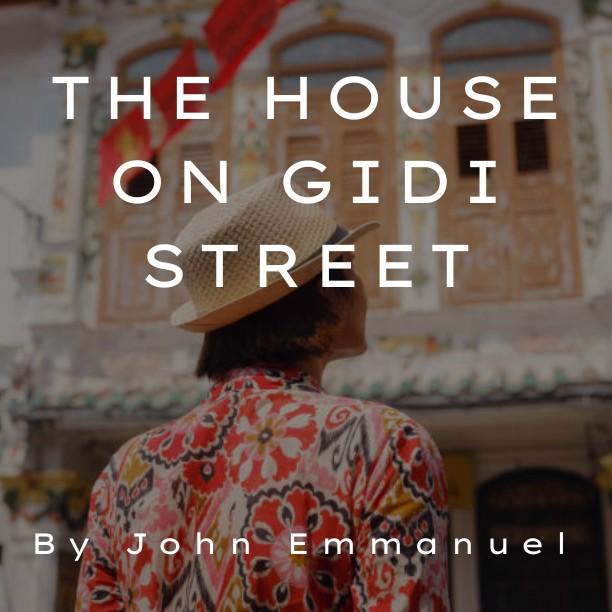
The Letter That Shattered My Silence
They say ghosts don’t wear chains anymore.
They wear silence.
Two decades of it.
That’s how long it had been since I last set foot on Gidi Street — since I last heard my father’s voice, cold as steel and just as sharp.
The lawyer’s letter found me in my Boston office, tucked beneath blueprints for a new skyscraper. It wasn’t the first time I tried to build something taller than my pain. But this—this thin, cream-colored envelope with Nigeria stamped in bold—brought everything crashing down.
Your father is dead. You are now the legal owner of 11 Gidi Street.
I didn’t cry.
Not then.
Grief requires love, and I had buried both in separate coffins.
Returning to the Scene of My Becoming
Gidi Street hadn’t changed.
The houses still leaned on each other like drunk old men. Children played with punctured tires. The gutters overflowed with yesterday’s secrets. But it wasn’t the street that undid me—it was the house.
Number 11 stood like a forgotten monarch: peeling paint, broken windows, rust-stained gates. But it still wore its bones with pride. My mother once called it the last thing your grandfather left us that hadn’t been corrupted.
Inside, it smelled of old wood and older memories. Dust danced in sunbeams like spirits whispering, “We remember.”
And in the living room, seated like she owned the past and future both, was my aunt Ngozi. Wrinkled. Unmoved. Still wearing her grief like a badge of honor.
“You finally came,” she said, sipping palm wine from the same cup she beat me with years ago.
The Night That Broke the Family
You want to know why I left?
My mother died the night thunder broke the sky and silence broke the house. I was sixteen. My brother Chuka was twelve. She had been crying again—that quiet, helpless cry women do when they’ve stopped fighting. And then… silence.
We found her slumped by the bathroom. They said she slipped.
But my brother saw something I didn’t.
And after the funeral, he disappeared too.
My father said good riddance.
I said nothing.
I packed a bag and left for a boarding school in Enugu. I never came back.
Until now.
The Diary in the Attic
The house had secrets, and I didn’t come looking for forgiveness. I came looking for answers.
The attic was locked. Aunt Ngozi said it had been for years, ever since “the curse of your mother’s ghost started hovering.” I didn’t believe in ghosts—but I believed in silence, and that’s worse.
I broke the lock.
Inside: dust, photo albums, a wedding dress yellowed with time—and a black leather diary tied with a gold ribbon.
My mother’s handwriting slanted across the first page like a whisper:
“If you’re reading this, it means you came back. I’m sorry for all the things I didn’t say. I was trying to protect you. I just didn’t know how.”
Each page peeled back years of smiling lies.
My father—stern, respected, a deacon—was a man of raised hands. And not the holy kind.
She stayed for us.
And it killed her.
The Boy Who Stayed Behind
Dele was still here.
The boy who once gave me chin-chin in class and swore he’d marry me under the mango tree.
Now he was a man with calloused hands, soft eyes, and a loyalty I couldn’t understand. He’d been helping my aunt “manage the house” in my absence. But he was more than a caretaker. He was memory’s anchor.
Over suya and Star beer, he asked:
“You ever wonder why Chuka left without a word?”
“I was afraid to ask,” I said.
And it was the truth.
Dele’s eyes flicked toward the attic. “He knew. About your dad. About what happened to your mum.”
I looked away.
“He came to me that night. Begged me not to say anything. Said he’d make it right in his own way.”
I felt my lungs closing in.
I wasn’t ready for what was next.
But it came anyway.
The Return of My Brother
He walked in during the lawyer’s second visit. Same eyes. Sharper edges. The room went still like Lagos before a power cut.
“You’re early,” he said to the lawyer.
Then looked at me. “And you… you’re late.”
His voice was gravel.
His smile—nonexistent.
“I didn’t know you were alive,” I said.
He scoffed. “You didn’t ask.”
He was right.
But when I showed him the diary, something shifted. His fingers trembled as he read, and for a second, I saw the boy who used to build sand castles with me in the compound.
“I tried to tell someone,” he said, voice cracking. “They called me a liar. Said I was disturbed. Said I must have pushed her.”
That’s why he ran.
That’s what he carried.
And I had carried the shame of not asking, of not looking back.
Blood and Cement
The house was marked for demolition. The government said it was “too old” for redevelopment plans. Classic Lagos real estate politics.
My family said, Let it go. Sell it. Let the past die.
But I stood in that living room, dust in my lungs and tears in my eyes, and said:
“No. This house doesn’t get to die in silence like my mother did.”
Chuka fought me.
My aunt mocked me.
Even Dele tried to talk sense into me.
But I’d been running my whole life—from memory, from pain, from home. I wasn’t running anymore.
We fought the case.
We lost.
But not before I got something better than land.
What We Inherit
We inherit more than money, more than land, more than blood.
We inherit wounds, and silence, and shame.
But we can also inherit truth—if we dig through the ruins long enough.
I moved back to Boston with the diary and a brother who finally let me hug him before I boarded the plane.
Dele kissed me on the forehead. Said, “Come back when you’re ready to build again.”
I will.
Not a house.
A legacy.
The House Didn’t Survive. But I Did.
The house on Gidi Street is gone now—flattened, buried under a new shopping plaza named after a senator.
But I kept the front door knob.
I keep it on my desk like a relic.
Proof that something once stood.
That we once stood.
That love—no matter how bruised—can still grow in the cracks of concrete and memory.
Final Takeaway
Sometimes the home we’re searching for isn’t a place. It’s a truth. And finding it will break you open before it sets you free.
I tell the kind of love stories that stay with you — the messy, unfiltered kind that unravel slowly and cut deep. Inspired by real emotion, rich culture, and everything we never say out loud, my fiction lives at the intersection of vulnerability and power. If you’ve ever loved like your soul depended on it… welcome home.



